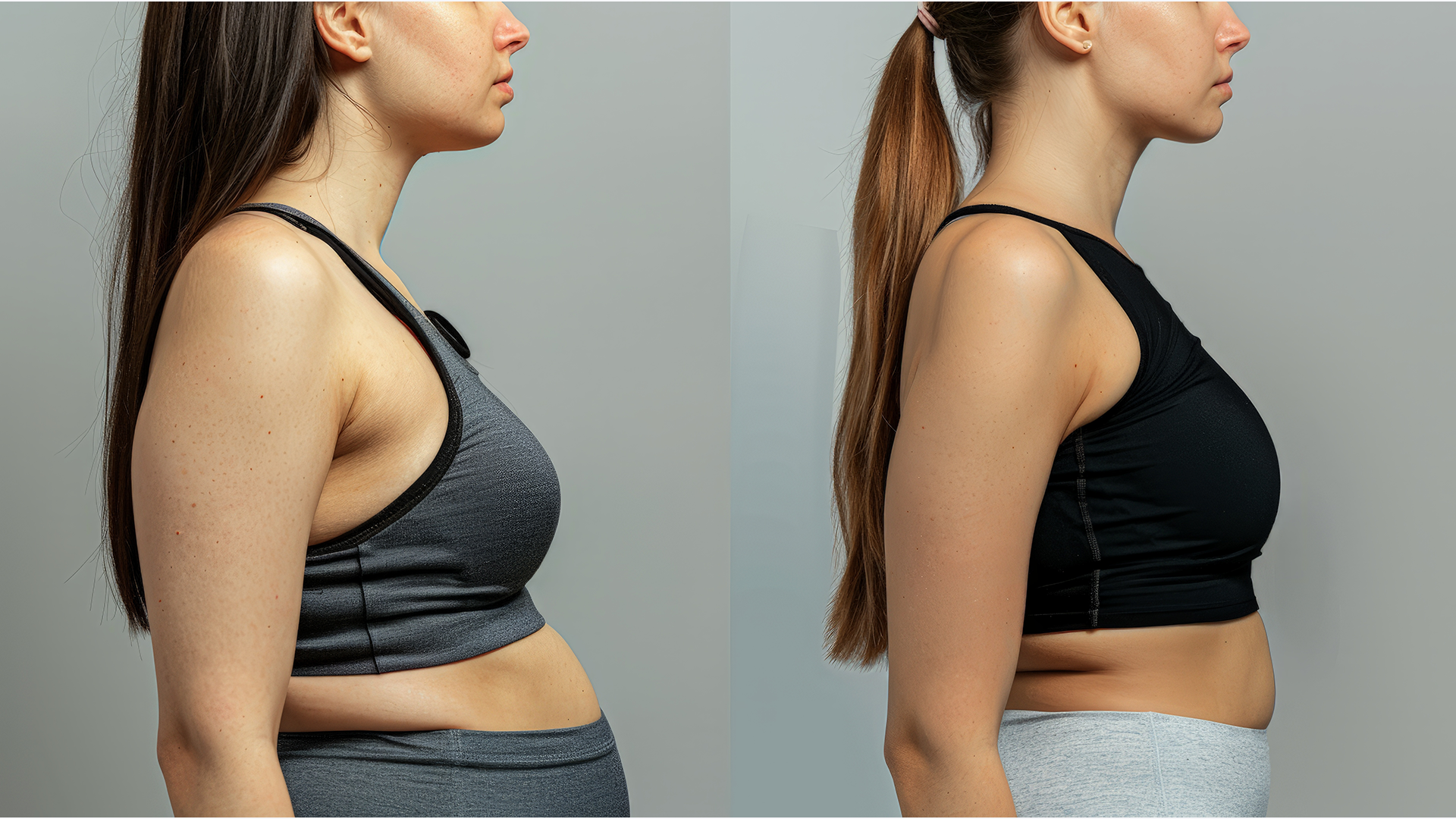Things you’ll learn here… |
Considering intermittent fasting (IF) for your weight loss journey?
Well, look no further. This no-nonsense intermittent fasting guide will give you all the information you need to succeed.
If you've been scrolling through social media or chatting with your fitness-savvy friends, you've probably heard the buzz around intermittent fasting. But what exactly is it, and could it be the game-changer you've been looking for?
Whether you're just dipping your toes into the world of weight loss or you've tried every diet under the sun, intermittent fasting might just be the fresh approach to reach your goals.
We're going to walk you through everything from the basics to the benefits—and even tackle those tricky questions you might be too shy to ask elsewhere.
We'll break down the different types of IF, explore the science behind how it works, and give you practical tips to get started. We'll also bust some common myths and address potential challenges you might face along the way.
Ready? Let’s go.
What exactly is fasting?
Fasting as a whole, isn’t a new concept. Throughout human history, fasting has been a common practice.
Fasting is taking a break from eating for a set period of time. It's like giving your body a mini-vacation from digesting food. Consequently, humans have developed the ability to endure long periods without food.
People fast for various reasons, including health benefits, religious practices (Islam, Christianity, Judaism, and Buddhism), or personal goals.
When you fast, your body gets a chance to focus on other important tasks, like repairing cells and balancing hormones.
Many who try fasting report feeling more energised, mentally sharp, and even experiencing a natural "glow" in their appearance.
What is intermittent fasting?

Intermittent fasting isn't just another diet trend—it's a powerful approach to eating that can unleash your body's natural fat-burning potential. At its core, intermittent fasting is about when you eat, not what you eat.
It involves cycling between periods of eating and fasting, typically with a daily eating window of eight to 12 hours followed by a fasting period of 12 to 16 hours.
This simple shift in timing can power up your metabolism, boost energy levels, and potentially lead to significant weight loss. While those two methods are the most common, there are several ways to do intermittent fasting.
The best part? Intermittent fasting is flexible and can be adapted to fit your lifestyle.
Whether you choose the popular 16/8 method, where you fast for 16 hours and eat within an eight-hour window, or opt for alternate-day fasting—the key is finding what works for you. As you embark on this journey, remember that your body is incredibly adaptable.
By giving it regular breaks from constant digestion, you're allowing it to focus on cellular repair and fat burning. While it may take some adjustment at first, many people report feeling more focused, energised, and in control of their eating habits once they settle into their fasting routine.
So, let’s get into the intermittent fasting benefits that can elevate your health.
Read: Unlock Your Ideal Sustainable Weight Loss Rate Today
What are the health benefits of intermittent fasting?

Intermittent fasting isn’t just another fad diet. It’s a lifestyle change that’s been backed by science and embraced by people all over the world.
While there are a plethora of reasons why people choose to fast, one common reason is the health benefits.
Let’s get into what IF can potentially do for your health.
Fat burning mode
When you're not constantly eating, your body's like, "Whoa, no new fuel coming in? Time to burn some fat!" It's your chance to break through that stubborn weight plateau.
Brain power boost
Fasting can make your brain feel sharper. It's like clearing out the mental fog and helping you focus better. You might just feel strong enough to tackle that tough homework or nail that presentation.
According to the National Library of Medicine, intermittent fasting can help improve mild cognitive impairment.
Other studies also claim increasing the production of a protein called BDNF. This could potentially help protect against conditions like Alzheimer's and depression.
Cellular cleanup
Your body starts a process called autophagy, which is like a deep clean for your cells. Out with the old, in with the new! It's how you keep your body running smoothly.
Hormone hustle
Fasting can help balance out your hormones. It might boost growth hormone (hello, muscles!) and improve insulin sensitivity. It's all about optimizing your body's systems.
Inflammation cooldown
Fasting can help reduce inflammation in your body. Less inflammation means you might recover faster from workouts and generally feel better.
Gut reset
Giving your digestive system a break can be like hitting the reset button. It might help with bloating and other tummy troubles.
Potential longevity boost
Some studies suggest fasting might help you live longer. It's like giving your body a tune-up to keep it running that little bit extra.
Note: Be mindful that everyone's body reacts differently. The key is to listen to your body and find what works for you. If you're feeling weak or unwell, that's your cue to eat something.
The main types of intermittent fasting diet

Whether you're looking to shake up your eating routine, boost your health, or just curious about what all the fuss is about—you're in the right place.
These fasting methods are like different flavours of ice cream—there's something for everyone—and you might need to try a few to find your favourite.
From easier beginner methods to more intense approaches, we've got the scoop on all the popular intermittent fasting styles that can help you elevate yourself and unleash your potential.
The 16/8 method: This is like skipping breakfast. You eat for eight hours a day and fast for 16. Maybe you eat from noon to 8pm and then chill without food until noon the next day.
The 5:2 diet: Eat normally for five days a week, then cut down to about 500 to 600 calories for the other two days. It's like giving your body a mini-vacation from all that food processing.
Eat stop eat diet: Once or twice a week, you don't eat for a full 24 hours. It's like telling your body, "Hey, let's take a day off from eating and see what happens!"
The warrior diet: You eat small amounts of raw fruits and veggies during the day, then feast like a queen at night. It's all about unleashing your inner warrior.
Alternate day fasting: One day you eat normally, the next day you eat very little. It's like a rollercoaster for your metabolism.
Spontaneous meal skipping: This is the laid-back approach. Just skip meals when you're not hungry or too busy. It's like telling your body, "We'll eat when we feel like it."
FYI: The key is to find what works for you. Intermittent fasting can help you conquer your fitness goals and elevate yourself to new heights.
But always listen to your body and talk to a healthcare professional before making big changes to your eating habits.
The side effects of intermittent fasting explained

So, by now, you know what the benefits of intermittent fasting can do for your health, but what exactly are the downsides of intermittent fasting?
Just like anything new, intermittent fasting can come with a few bumps along the way. Let’s uncover the side effects that can come along with IF.
- Hunger
- Tiredness
- Mood swings
- Headaches
- Dizziness
- Digestive changes
Remember: These side effects usually go away as your body gets used to the new routine. Hang in there.
Who should avoid intermittent fasting?

While intermittent fasting can be great for some, it's not a one-size-fits-all deal. IF might not be suitable for everyone due to different health status’ and lifestyle reasons.
Here's the scoop on who should avoid jumping on the fasting bandwagon…
- Pregnant or breastfeeding women: Your body needs consistent fuel for you and your little one.
- Kids and teens: You're still growing. Your body needs regular nutrition to develop properly.
- People with a history of eating disorders: Fasting could trigger unhealthy behaviors.
- Diabetics: Especially if you're on medication, fasting can mess with your blood sugar levels.
- Those with chronic health conditions: Check with your doc first—some conditions don't mesh well with fasting.
- Anyone underweight: Underweight individuals should focus on gaining weight healthily under medical supervision. So, fasting would not be a good idea.
- People taking certain medications: Some meds need to be taken with food.
- Those with a history of low blood pressure: Fasting can sometimes make you feel dizzy or lightheaded.
- Older adults: You might be more at risk for nutrient deficiencies.
- Super active folks: If you're training hard, your body might need more regular fuel.
Related: 6 Proven Strategies For Successful Weight Loss
How to lose weight and feel good: Our insider tips

At this point, you have what you need to kickstart your intermittent fasting journey. But, we’ve got some additional insider tips for sustainable weight loss that also keep you feeling fantastic. Once you implement these lifestyle changes, you will be unstoppable.
Here are the tips you need to achieve your goals in a healthy and sustainable way.
Stay hydrated
Drinking plenty of water helps keep your metabolism running smoothly and curbs those sneaky hunger pangs.
Balanced meals
Focus on a mix of lean proteins, healthy fats, and plenty of veggies. Think colorful plates and whole foods.
Regular exercise
Find activities you love, whether it's dancing, hiking, or yoga. Consistency is key, so make it fun. Working out will help you burn calories, build muscle and improve your overall health. Regular exercise is your best friend.
Get enough sleep
Aim for seven to nine hours a night. Good sleep helps regulate your hunger hormones and keeps your energy up.
Mindful eating
Pay attention to what you eat and savour every bite. This helps prevent overeating and makes meals more enjoyable.
Portion control
Use smaller plates and be mindful of serving sizes. It’s easier to manage your intake this way.
Healthy snacking
Keep healthy snacks like nuts, fruits, and yogurt handy to avoid reaching for junk food.
Stay positive
Celebrate your progress, no matter how small. A positive mindset keeps you motivated and feeling good.
Support system
Surround yourself with supportive friends and family, or join a community with similar goals. Sharing your journey makes it easier.
Listen to your body
Everyone’s different, so find what works best for you. Pay attention to how your body responds to different foods and exercises.
Read: Calories And Weight Loss: Everything You Need To Know
What are the best foods to have when fasting?

When fasting, the foods you consume during your main meals (especially during the pre-fast and post-fast meals) should be nourishing, hydrating—and provide sustained energy.
We’ve put together a list of the best foods you should add to your main meals…
Pre-fast meal
Complex carbohydrates…
- Whole grains: Oatmeal, quinoa, whole wheat bread, brown rice, and barley provide long-lasting energy.
- Starchy vegetables: Sweet potatoes and butternut squash are rich in fiber.
Protein-rich foods…
- Eggs: Boiled, scrambled, or made into an omelet for a high-protein start.
- Greek yogurt: Offers a combination of protein and probiotics, helping out with your digestion.
- Nuts and seeds: Almonds, chia seeds, or flaxseeds can add protein and healthy fats.
- Avocado: Provides healthy fats that help keep you full longer.
- Nut butters: Almond or peanut butter on whole grain toast or added to smoothies.
Hydrating foods…
- Fruits and vegetables: Cucumbers, watermelon, oranges, and tomatoes help maintain hydration.
- Smoothies: Blend fruits, vegetables, yogurt, and some oats for a balanced and hydrating meal.
Fluids…
- Water: Drink plenty of water to stay hydrated throughout the fasting period.
- Herbal teas: Non-caffeinated options like chamomile or mint can be soothing.
Post-fast meal (breaking the fast)
- Dates: Traditional and excellent for quickly replenishing energy with natural sugars.
- Soups: Start with a light vegetable or lentil soup to rehydrate and prepare your stomach for the main meal.
- Fruits: Watermelon, oranges, and berries provide fluids and vitamins.
Lean proteins…
- Grilled chicken or fish: These are lighter on the stomach while providing necessary protein.
- Legumes: Lentils, chickpeas, and beans are excellent sources of plant-based protein.
Complex carbohydrates…
- Whole grains: Brown rice, quinoa, and whole wheat pasta offer steady energy.
- Vegetables: Opt for a variety of roasted, steamed, or sautéed vegetables.
Healthy fats…
- Olive oil: Use in salads or for cooking to include healthy fats in your meal.
- Nuts and seeds: Add to salads or eat as a side to boost the meal’s nutritional content.
Probiotic foods…
- Yogurt: Helps with digestion and replenishes gut flora.
- Fermented vegetables: Sauerkraut or kimchi.
By choosing the right foods before and after fasting, you can guarantee you’re getting the necessary nutrients to support your body during the fasting period.
Final thoughts…
And there you have it, folks. We've covered everything ‘intermittent fasting’. From potential health benefits to different fasting schedules, you're now equipped to give IF a try.
Remember, it's not a magic solution—but a tool that might work for you. Listen to your body, start slow, and have fun experimenting.
Whether you're looking to boost energy, manage weight, or just shake things up, IF could be your next wellness adventure. Good luck.
Arm yourself with the right knowledge to transform your weight loss journey

Unlock the secrets to a healthier, happier you! Join our PhenQ community for expert tips, delicious recipes, exciting workouts and motivational success stories that inspire real results.
Here, we cover a range of topics like sustainable weight loss strategies, meal plans, diets, weight loss supplements and myth-busting guides.
Get ready to be amazed by the all-you-need-to-know information about weight loss, from one source—our PhenQ blog’s ‘Weight Loss’ section.
FAQs
What is the most ideal intermittent fasting schedule?
According to your lifestyle and whether you're able to stop eating, the most common periods of intermittent fasting that work for most people are between 15/8 and 10/10 fast days.
How should a beginner start intermittent fasting?
For beginners, it would be best to fast for at least a day. This option lets you start fasting at 12 hours of sleep each day. After getting accustomed to 12-hour fasting, you can gradually increase your fast duration.
What are the best hours for intermittent fasting?
The best hours for intermittent fasting typically depend on your lifestyle and personal preferences, but a common and effective schedule is the 16/8 method. This means you fast for 16 hours and eat during an eight-hour window, like from 12 PM to 8 PM. This allows you to skip breakfast and eat lunch, dinner, and possibly a snack within that time frame.
Other popular schedules include the 14/10 method (14 hours of fasting and a 10-hour eating window) and the 5:2 method, where you eat normally for five days and significantly reduce calorie intake for two non-consecutive days. Choose the schedule that best fits your routine and helps you stick to it consistently
Do I need to eat breakfast to be healthy?
No, you don’t need to eat breakfast to be healthy. While some people find that eating breakfast gives them energy and helps them concentrate, others do just fine without it. The key is to listen to your body and ensure you’re getting enough nutrients throughout the day. It’s more important to focus on overall balanced eating and what works best for your lifestyle.




